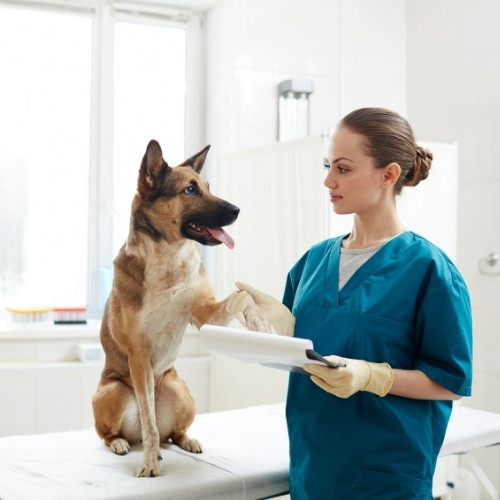Our services
Pet Vaccination in Seekonk, MA
Preventive care is essential for keeping pets healthy, and vaccinations help protect pets from various infectious diseases. Bristol County Veterinary Hospital in Seekonk, MA, provides comprehensive pet vaccination services for dogs, puppies, cats, and kittens. Our experienced team works with pet owners to ensure their pets receive the right vaccines to support lifelong health and well-being.
Why Vaccinate Your Pet?
Vaccinations are essential in preventing diseases that can be life-threatening for pets. Vaccinating your dog or puppy helps protect them from serious illnesses like rabies, distemper, parvovirus, and more. Many of these diseases are contagious and can spread quickly among animals, which makes regular vaccinations an important part of responsible pet ownership.
Canine Vaccines
Our canine vaccination protocols include protection against several serious and contagious diseases. Core vaccines include Rabies and DHPP (Distemper, Hepatitis, Parvovirus, and Parainfluenza). Based on lifestyle and exposure risks, we may also recommend Leptospirosis, Lyme, Bordetella (“Kennel Cough”), Canine Influenza (“Dog Flu”), and annual 4DX testing to screen for tick-borne illnesses and heartworm disease.
Rabies
The rabies vaccine for dogs is a crucial step in protecting against the deadly viral disease of rabies, which affects the central nervous system of mammals, including humans. The disease is mainly transmitted through bites and saliva/blood. In Massachusetts and Rhode Island, the law mandates the administration of the rabies vaccine to dogs. The first dose is given at 16 weeks of age and provides protection for 1 year. To maintain this protection, boosters are required within 9-12 months for a 3-year vaccine certificate. Massachusetts and Rhode Island rabies vaccine protocols are slightly different after the dog has qualified for their first 3-year vaccine and are listed below:
Massachusetts: “Once a 3-year, always a 3-year” – As long as your dog’s booster is given within 9-12 months from the initial 1-year vaccine, your dog’s subsequent rabies vaccines will always qualify for a 3-year Massachusetts vaccine and certificate.
Rhode Island: In order to qualify for a 3-year Rhode Island vaccine and certificate, your dog’s rabies vaccine must always be boostered prior to the previous rabies vaccine’s expiration date.
DHPP
Leptospirosis
Leptospirosis, a rickettsial bacterial disease spread through the urine of wild animals, is a concerning threat in certain areas of the United States. Not only can it cause fatal liver and kidney disease in animals, but it also poses a risk to human health through contact with infected animal urine. To protect against this potential danger, the leptospirosis vaccine is highly recommended on a yearly basis for those in endemic areas. By administering this vaccine, pet owners can safeguard their animals and reduce the risk of transmission to themselves.
Bordetella "Kennel Cough"
The Bordetella vaccine, also known as the kennel cough vaccine, is designed to protect against the bacterial respiratory pathogen Bordetella. This bacterium is easily spread through the air and is highly contagious, causing a distinctive honking cough in infected dogs. Although the infection is rarely fatal, it can lead to pneumonia and is most commonly contracted in high-risk environments such as boarding kennels, doggy daycare centers, and grooming facilities. The vaccine can effectively prevent outbreaks of this infection and is highly recommended for any dog that will be in these types of situations. As a lifestyle vaccine, it is also important to note that the Bordetella vaccine is often required for dogs boarding in certain facilities.
Lyme
The Lyme disease vaccine protects against the bacterial infection caused by Borrelia burgdorferi, which is transmitted by the deer tick Ixodes scapularis in the Northeastern U.S. This disease affects not only dogs but also cats and humans. Though commonly associated with wooded areas, ticks can be present in any yard in the Northeast. While up to 95% of infected dogs may not show symptoms, when they do, they can experience fever, loss of appetite, joint pain and swelling, limping, and lethargy. In severe cases, Lyme disease can lead to kidney disease and even death. Given the risk of ticks in the area and the potentially fatal consequences of Lyme disease, it is strongly recommended to get the Lyme vaccine for any dog that goes outside, in addition to monthly flea and tick prevention.
4DX
The 4DX test is a quick, in-house blood screening that provides insightful information about the health of your dog. It can identify the presence of several infectious diseases in dogs that appear healthy. Just a few drops of blood and eight minutes can help us to determine if your pet has been exposed to:
- Dirofilaria immitis (heartworms)
- Borrelia burgdorferi (Lyme disease)
- Anaplasma phagocytophilum/platys (anaplasmosis)
- Ehrlichia canis/ewingii (Ehrlichosis)
Canine Influenza "Dog Flu"
The H3N8 Canine Influenza Virus can cause respiratory infections with symptoms such as coughing, fever, lethargy, nasal and eye discharge, and in severe cases, pneumonia or death. This virus is primarily a risk for dogs with a lifestyle that includes frequent grooming, socializing with large groups of dogs at kennels or doggy daycare, or boarding. To protect against this disease, we recommend the canine flu vaccine for any dog that fits this lifestyle.
Feline Vaccines
Cats receive core vaccines such as Rabies and FVRCP (Feline Viral Rhinotracheitis, Calicivirus, and Panleukopenia). For cats with outdoor access or multi-cat environments, we may also recommend the Feline Leukemia (FeLV) vaccine and FeLV/FIV testing to monitor for common infectious diseases.
Rabies
Rabies for cats is a viral disease spread through saliva and bites that can impact the central nervous system of mammals, including cats. In fact, there are four times more cases of cats being diagnosed with Rabies annually compared to dogs. To see how many cases have been reported yearly, go here: https://www.rabiesaware.org/. Both Massachusetts and Rhode Island require the rabies vaccine by law, with guidelines and frequency determined by state laws. The initial vaccine can be given at 16 weeks of age and lasts for 1 year.
We offer the option of a 3-year rabies vaccine or a 1-year Purevax Vaccine for Rabies. The Purevax vaccine is a safer option, as it doesn’t contain adjuvants and reduces the risk of vaccine-associated sarcomas, which are a rare but possible side effect of the rabies vaccine in cats. Keep your cat safe and make sure they are up-to-date with their rabies vaccine.
The 3-year vaccine is the same used for dogs. State requirements can be seen above.
FVRCP
Ensure your cat’s health and safety with the FVRCP vaccine. This combination vaccine is recommended for all cats and protects against three common feline viruses – feline viral rhinotracheitis, calicivirus, and panleukopenia virus.
Feline viral rhinotracheitis is a respiratory infection caused by the herpes 1 virus, which is highly contagious between cats through the air or contaminated objects. This virus can cause chronic disease or lay dormant with intermittent flare-ups.
Calicivirus is also a highly contagious upper respiratory infection, often causing oral ulcers, and can be spread through carriers who shed the virus.
Panleukopenia virus, also known as feline distemper, is a severe and extremely contagious infection similar to Parvovirus in dogs. It can be fatal and causes symptoms such as fever, anorexia, vomiting, diarrhea, and dehydration.
The FVRCP vaccine for cats is extremely effective and highly recommended for all feline companions.
Feline Leukemia (FeLV)
Prevent the spread of feline leukemia virus with our recommended testing and vaccination options. FeLV is a highly contagious disease that causes immunosuppression and is a leading cause of death in cats. It is spread through saliva, from cat to cat, through grooming, food and water sharing.
We recommend that all cats be tested for FeLV at 12 weeks of age or older. If your cat will be an indoor-only cat and will not be exposed to other cats, the vaccine may not be necessary. However, if your cat will be outside or in contact with cats of unknown FeLV status, the vaccine is strongly advised to protect their health.
Take the necessary steps to protect your feline friend from the dangers of FeLV with our recommended testing and vaccination options.
FeLV/FIV Testing
Ensure accurate testing results for FeLV by following our recommended schedule. Testing should be done before vaccinating, at around 12 weeks of age. However, it’s important to note that tests conducted before a cat reaches 1 year old may produce false negatives. Therefore, we advise retesting once the cat is over 1 year of age.
Why Choose Bristol County Veterinary Hospital for Pet Vaccinations?
- Customized Vaccination Plans: We tailor each vaccination schedule to meet your pet’s specific needs.
- Experienced Veterinary Team: Our veterinarians are well-versed in current vaccination guidelines and follow best practices for pet preventive care.
- Convenient Appointments: Our flexible scheduling allows you to keep your pet’s vaccines up-to-date easily.
Keeping your pet’s vaccinations current is one of the most effective ways to support their health and longevity. If you’re looking for a trusted dog vaccine clinic in Seekonk, MA, our team at Bristol County Veterinary Hospital is here to help.
Contact us today to schedule a vaccination appointment or to learn more about our services. We’re here to help you give your pet the best possible care.

